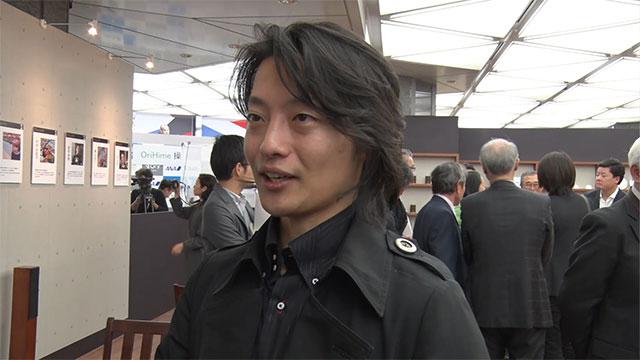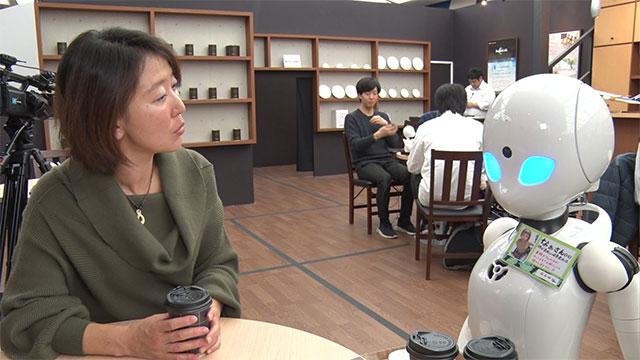A difficult choice
Many people who become bedridden due to accidents or illnesses such as ALS think they cannot work anymore. Even if they can, they usually work alone from their beds without communicating with others. It makes them feel like they no longer matter to society.
ALS patients gradually lose control of their muscles and become unable to breathe. They must choose whether to use a respirator, which requires surgery to the throat and leads to voice loss. They must also be monitored around the clock. There's a large financial and mental burden on patients' families.
But without a respirator, patients will not be able to breathe. There are nearly 10,000 ALS patients in Japan and about 30% of them reportedly use respirators. The rest have succumbed to the illness.

Hiroki Okabe, whom I talked to in my report, developed ALS 12 years ago. He breathes through a respirator. Instead of talking, he communicates with others using a transparent board with characters and numbers on it. A skilled helper follows his eye movements to understand what he is trying to say.
Okabe says he thought he would never be able to work again when he developed ALS, and had no reason to live.
But another ALS patient changed his mind. That patient worked from bed to support those with severe disabilities. This inspired Okabe to go on living and do the same. Since then, Okabe has provided encouragement to other patients and helped more people become aware of the disease. He became the director of the Japan ALS Association and makes speeches in public.
But he still feels isolated at times due to his inability to move freely, and says the robot cafe is an innovative way for patients to work and communicate with people in real time.
Avatar robots
Until recently, I thought that robots perform independently through AI and can replace humans.
But the cafe's concept is completely different. The robots there are avatars.
Imagine getting old and spending most of your time in bed being assisted by a helper. You will probably feel hesitant or irritated to ask for support.

The robot's developer, Kentaro Yoshifuji, CEO at OryLab Inc., says that in the future, everyone will have their own avatar.
Yoshifuji's concept comes from his childhood experience. He didn't want to go to school and shut himself in his room, avoiding communication with the outside world. During that time, he thought that having an avatar would have enabled him to communicate with others.
He launched a venture company to develop robots when he was a university student.
His first robot is 20 centimeters tall and is called Orihime. Orihime has a microphone that is controlled by a speaker far away. It can make others feel the speaker is actually there with them.
At Yoshifuji's company, some employees work from home through Orihime.

Yuta Banda was one of them. Banda lost his ability to move when he was 4 years old due to a traffic accident. He never had the opportunity to go to school or make friends.
But in an attempt to connect with the outside world, he sent messages to about 6,000 people whom he had never met. Yoshifuji was one of them. Since then, Yoshifuji and Banda have worked together. Banda's avatar Orihime was in the office in Tokyo while Banda lay in his bed in Morioka, more than 500km away.
Two years ago, they had a chat through Orihime. Yoshifuji jokingly asked Banda to bring him a coffee. Banda answered, "I really would like to. Please develop a robot that moves for me."
This was the beginning of the development of a new robot. They worked together to improve the Orihime, considering the necessary functions and movements.
But Banda passed away last year at the age of 28 without seeing the new robot. Yoshifuji continued to develop the robot to make Banda's dream come true.
And finally, he succeeded. Yoshifuji says the new robot, called Orihime-D, is still being improved. During the trial at the cafe, he noticed a lot of errors and collected a lot of information. He hopes to open a robot cafe by 2020.

Providing encouragement beyond borders
The cafe aims to use robots to expand job opportunities for people with disabilities. This is the first of its kind in Japan. The organizer says it may even be the first in the world.
The customers at the cafe said, "In the beginning, I thought it was just a robot. But gradually, I felt like I was talking to a human."

Media from other countries like South Korea and Germany were also at the cafe. They appeared to be very interested in the idea.
Yoshifuji hopes that the robot cafe will encourage patients not only in Japan but across the world to choose to live with hope and dignity.
When I asked some of the patients what it means to them to work, they answered that it gives them a reason to live. Okabe also said, "I was very happy because I could talk to people and make them happy. I found myself again thanks to my avatar."
While there is talk of robots stealing jobs from humans, that is not necessarily true. They can act as tools to strengthen our abilities. Anyone can become bedridden, including myself. But if my avatar stands by me, I may be able to remain an active part of society. Robots can help create a society in which everyone who wants a job can find one.
